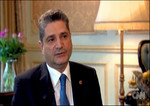Thursday, 16 June 2011
RA Prime Minister Tigran Sargsyan: Export promotion is still a primary objective for us
CNN TV channel aired yesterday evening an interview with Armenian Prime Minister Tigran Sargsyan. We present the complete interview bellow:
The first question related to the impact of the world economic crisis on Armenia’s economy and steps undertaken to overcome it.
PM- The first problem that we encountered after the contraction was that the contraction was largely due to the fact that our economy was not sufficiently diversified. Our crisis response focused on three areas: further diversification of the economy, improving the infrastructure and improving the business environment and we hope that with continued reform efforts we will be able to further boost the environment and overcome the consequences of the crisis.
Your exports represented 20 percent of GDP in the year 2000 and only 12 percent today. How do you boost the industrial base then?
PM- Unfortunately our trade balance still remains significantly negative. Export promotion is still a primary objective for us and our exports are currently heavily reliant on three areas: mining, the IT and High-tech industry and tourism.
What percentage of the economy still remains with the Diaspora? You have almost as many people living outside the country as you do within.
PM- Of course, the Diaspora was the primary source of investment for Armenia’s economy. Currently its share in the GDP can be estimated as high as from 60 to 70 percent. Of course, investments from the Diaspora came not only in the form of foreign direct investments, but also as private remittances which have helped Armenian to overcome the consequences of the economic contraction.
A cloud always hangs over Armenia because of a dispute of Nagorno-Kharabagh. In this respect, there are some expectations from the trilateral meeting between Russia, Armenia and Azerbaijan due late this month. Is a there a realistic framework after many, many years of dispute to move forward on this?
PM- The Armenian leadership has the political will to move on to an agreement and we realize it’s not easy, but we also hope that our Azerbaijani counterparts will demonstrate political will as well.
Would you say the same thing about Turkey? A path towards normalization is not there because of the atrocities of WWI.
PM- In the last 20 years Armenia has had a very clear political position on this issue. We are ready to normalize our relations with our neighbor Turkey without any preconditions. Now recent events have shown that Turkey is not ready to do the same.
You have Turkey with a large economy of 80 million consumers. Did you feel that it is difficult for Armenia to negotiate this dispute with the Turkey’s role in the region, even as a G20 member?
PM- It is not just an issue for Armenia. Turkey’s political clout and weight will only grow if Turkey follows the international rules of the game. Its clout is undermined by the problems that Turkey is continuing to have with its neighbors. Turkey should continue to carry out democratic reforms on the path towards EU accession in which case we are easily able to build sustainable relations with our neighboring country.







